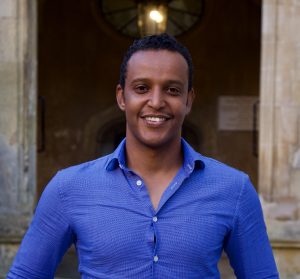Elsiddig Elmukashfi

Please briefly introduce yourself and what you are currently doing
My name is Elsiddig Elmukashfi from Sudan. I’m currently a postdoctoral researcher at the Department of Engineering and a lecturer in Engineering Science at St Anne’s in Oxford. I received B.Sc. in Mechanical Engineering from University of Khartoum in Sudan and M.Sc. in Engineering Mechanics and Ph.D. in Solid mechanics from the Royal Institute of Technology in Sweden. I study how materials – from metals to biological tissues – fail under different loading conditions, environment and in presence of flaws like cracks (it is called fracture and damage mechanics). The major question I have long been interested in is how to relate the loading parameters, environmental conditions to the actual physical process of creation of new surfaces? To answer such questions, I develop mathematical models that are useful to understand and predict the phenomena; these can be then used to and design reliable products in nuclear reactors, gas turbines and aircrafts, or soda can pull tab.
When did you join St Anne’s and how have you found your time at the College?
I joined St Anne’s in 2017 as a lecturer in Engineering Science after joining the Department of Engineering at Oxford in 2016. I have found the atmosphere to be very friendly which allows me to interact with different members from early career researchers to senior fellows. The experience has been very rewarding for me as an early career researcher in terms of exchanges with my peers and seeking advice from the senior fellows. The interaction with students has been very stimulating and joyful to all of us and it makes me happy to see the students set on their journeys toward high achievement. Last but not the least, I have enjoyed every single meal in the college with the fantastic kitchen staff.
What is your favourite place in Oxford?
The magical Radcliff camera! I often visit the camera seeking a quite reading session and it feels like actually traveling back in time.
What is your specialist subject and how did you become interested in this area?
I primarily work on the area of fracture and damage mechanics of different material systems such as metals, polymers and biological tissues. The fracture and damage mechanics are fields concerned with the studying of damage initiation and propagation in materials under mechanical loading and in different environments. Since I was a kid, I have wondered why a glass cup may or may not be shattered when it is dropped and why the tire of our car may or may not explode when it is punctured. As an undergraduate, I studied mechanical engineering which provided me with the basic knowledge. Thereafter, when I worked in oil industry, I started to understand the real application of fracture and damage mechanics. This experience motivated me to pursue a deeper knowledge in the field and to seek an academic career and that is how I ended up travelling to Sweden to join a world class university such as KTH.
Have you found any challenges working in academia? If so, how have you overcome them?
I find the main challenge in academia to be the balance between quantity and quality of the research work. When I decided to pursue academia, my sole objective was to make an impact that changes the world for the better. However, the contemporary academia seems to be more about chasing citations. I still live my dream of making an impact through performing high quality research and also trying to bridge the gap with the policymakers or businesses.
What is your advice for any others looking to pursue academia?
My advice is to aim for discovering new things and solving important problems for practitioners and policy makers, rather than focusing on chase of citations.
Have you joined St Anne’s from another institution? If so where and how do you find the two places differ?
I was at the Royal Institute of Technology (KTH) in Sweden which is one of the top engineering universities in the World. My experience there was great and prepared me well for my future endeavours. Joining Oxford and St Anne’s has been more fulfilling in terms of the international community, inclusiveness and social and scientific engagement. Also, I love the personalised teaching which I find very important in increasing students’ intellectual development. However, I still believe that University of Oxford should be more inclusive for BAME students and academics.
What is your favourite way to relax?
I like hiking which gives me the room to relax and reflect on my life.